Masticatory Muscle Myositis, Trigeminal Neuritis, and Trigeminal Nerve Sheath Tumors in Dogs: How to Tell Them Apart
Home » Blog » Masticatory Muscle Myositis, Trigeminal Neuritis, and Trigeminal Nerve Sheath Tumors in Dogs: How to Tell Them Apart
Masticatory muscle myositis, trigeminal neuritis, and trigeminal nerve sheath tumors are three different neurological diseases affecting the muscles and nerves of the head in dogs.
“While these conditions are not exactly rare, they occur just infrequently enough to be confused – even by veterinarians,” points out Dr. Michael Wong, Founder and Veterinary Neurologist at Southeast Veterinary Neurology.
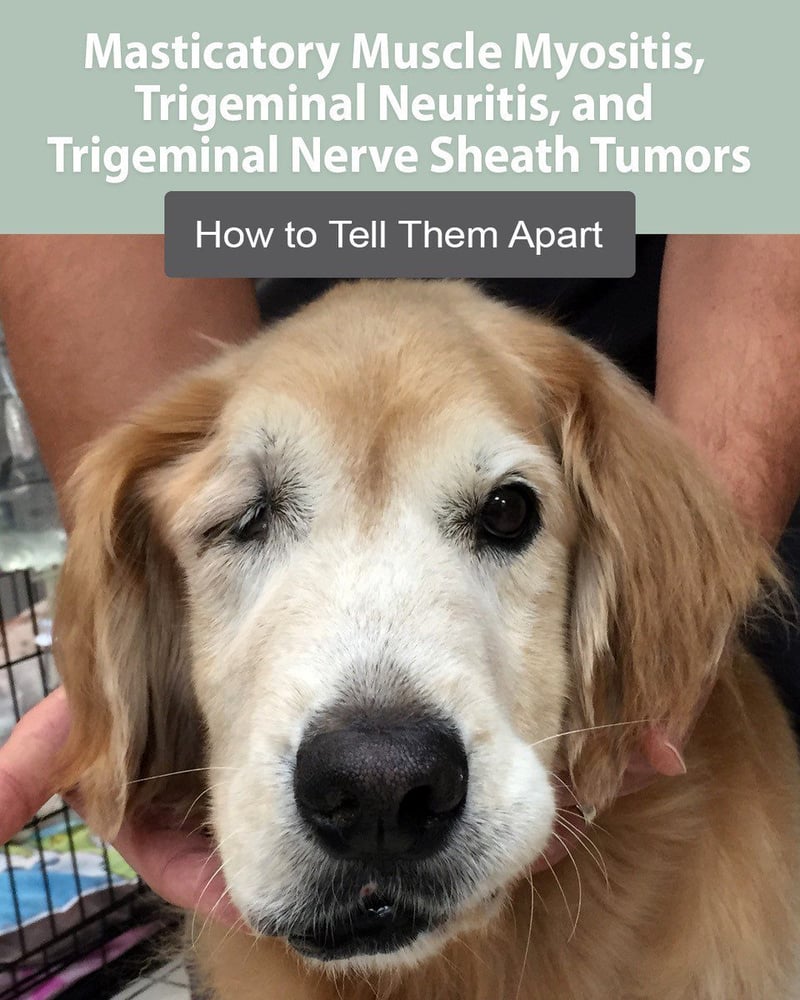
So how can we tell them apart?
For starters, masticatory muscle myositis causes difficulty opening the mouth, trigeminal neuritis causes difficulty closing the mouth, and trigeminal nerve sheath tumors cause atrophy of the muscles of mastication on one side of the head.
Masticatory Muscle Myositis and Inability to Open the Mouth in Dogs
A dog’s inability to open the mouth, ortrismus, can be caused by things like trauma to the temporomandibular joint (TMJ), abnormal bony growths of the TMJ, tetanus, and more. However, the most common cause of trismus in dogs is masticatory muscle myositis.
What Is Masticatory Muscle Myositis in Dogs?
Masticatory muscles or muscles of mastication refer to the muscles used for chewing. Myositis refers to any condition causing inflammation of the muscles. So masticatory muscle myositis is an inflammation of the chewing muscles.
Masticatory muscle myositis is caused by an overly strong response from a dog’s immune system against the muscles of chewing. In autoimmune disorders, the immune system identifies the body’s own healthy cells as foreign threats and attacks them.
What Are Signs of Masticatory Muscle Myositis in Dogs?
One of the first signs of masticatory muscle myositis owners may notice in their dogs is swelling of the head muscles. Later on, however, the muscles of the head may actually shrink, oratrophy, causing the cheek bones to become more noticeable.
Clinical signs of masticatory muscle myositis in dogs include:
- Not wanting to open the mouth
- Not wanting to chew toys or even hard food
- Pain when opening the mouth
- Atrophy of the head muscles
How Is Masticatory Muscle Myositis in dogs Diagnosed?
Masticatory muscle myositis can be suspected based on these clinical signs, but testing is required for an accurate diagnosis. A physical examination is always performed first. Blood tests, including anIIM antibody titer , may also be performed.
“In certain cases, MRI of the head may be recommended. For example, MRI may be necessary to rule out other causes if the IIM antibody test did not give a clear answer, or to further evaluate the extent of inflammation,” adds Dr. Wong.
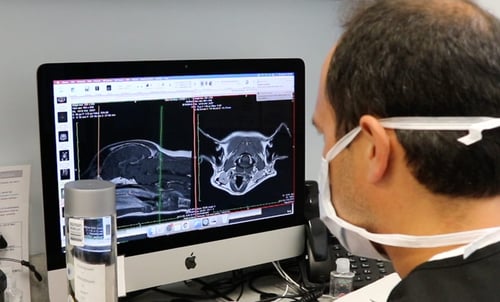
Additionally, a biopsy of the chewing muscles may be required.
How Is Masticatory Muscle Myositis in dogs Treated?
Treatment of masticatory muscle myositis is aimed at suppressing the dog’s overly active immune response against the masticatory muscles, which is generally achieved through the administration of immunosuppressant medications like steroids. Medications are given for several weeks to months, during which time the IIM antibody test may be repeated along with follow up exams to monitor progress.
The prognosis for masticatory muscle myositis in dogs is overall good if diagnosed and treated early.
Trigeminal Neuritis and Inability to Close the Mouth in Dogs
A dog’s inability to close the mouth, ordropped jaw, can be caused by trauma to the temporomandibular joint, but it is most often due to trigeminal neuritis.
What Is Trigeminal Neuritis in Dogs?
The trigeminal nerve is also known as cranial nerve V. It arises from the base of the brain and has several functions, including supplying the muscles of mastication. Neuritis means inflammation of one or more nerves. So, in contrast to masticatory muscle myositis in which the muscles are inflamed, trigeminal neuritis is an inflammation of the trigeminal nerves.
“Similar to masticatory muscle myositis, inflammation of the trigeminal nerves is thought to be autoimmune in origin. The underlying cause of an overactive immune system is not usually identified,” explains Dr. Wong.
What Are Signs of Trigeminal Neuritis in Dogs?
When both trigeminal nerves are inflamed, a dog is unable to close the mouth. However, even though the mouth is hanging open, tongue movement and swallowing remain normal.
Clinical signs of trigeminal neuritis in dogs include:
- Unable to close the mouth
- Difficulty getting food into the mouth
- Unable to chew
- Normal tongue movement and swallowing
- Difficulty drinking
- Drooling
How Is Trigeminal Neuritis in dogs Diagnosed?
Trigeminal neuritis can be suspected based on examination and history, but further testing is needed to be sure that an inability to close the mouth is not caused by something else.
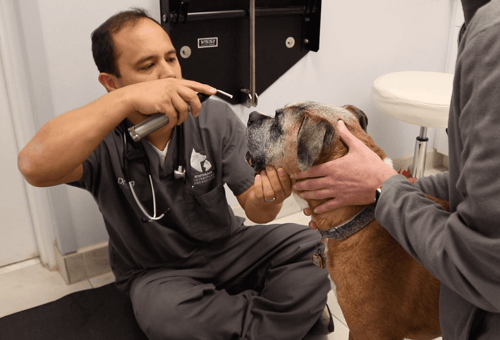
A physical examination, blood tests, and X-rays are the first step. MRI of the head and cerebrospinal fluid analysis are also necessary to visualize the trigeminal nerves and rule out other causes.
How Is Trigeminal Neuritis in dogs Treated?
Treatment of trigeminal neuritis mostly consists of supportive care, as medications do not necessarily help the condition, and nearly all dogs will recover over time.
“In the meantime, dogs will most likely need help eating and drinking, and a soft food diet may be helpful,” says Dr. Wong.
Prognosis for trigeminal neuritis is generally good with supportive care. Most dogs will regain nerve function within a few weeks, but a full recovery could take months.
Trigeminal Nerve Sheath Tumors and Unilateral Masticatory Muscle Atrophy in Dogs
The most common cause of unilateral atrophy of the muscles of the head (sunken muscles on one side of the head) is a trigeminal nerve sheath tumor.
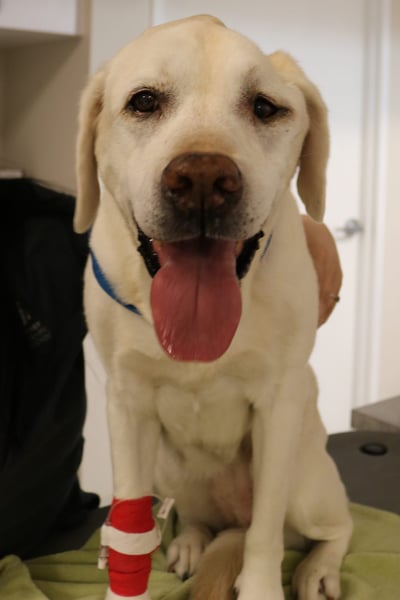
What are Trigeminal Nerve Sheath Tumors in dogs?
A trigeminal nerve sheath tumor develops from the cells that cover and protect the trigeminal nerve. They are slow-growing tumors that are locally invasive, but do not usually metastasize, or spread to other parts of the body.The cause is unknown.
What Are Signs of Trigeminal Nerve Sheath Tumors in Dogs?
One of the most obvious signs of trigeminal nerve sheath tumors in dogs is for one side of the head to be sunken in. Since the trigeminal nerve supplies the muscles of mastication, these muscles can become smaller and atrophy if the nerve is damaged.
Clinical signs of trigeminal nerve sheath tumors in dogs may include:
- Unilateral masticatory muscle atrophy
- Loss of facial sensation
- Horner’s syndrome
- Corneal ulcer that does not respond to therapy
- Weakness in the limbs of the same side of the body
- Seizures
- Behavior changes
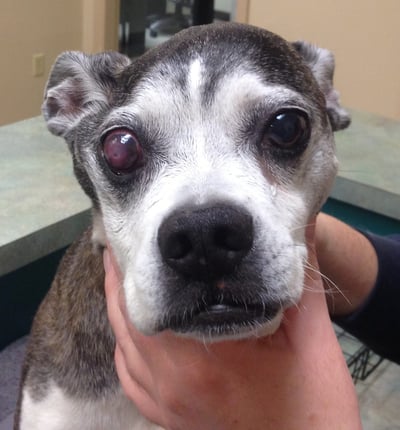
How Are Trigeminal Nerve Sheath Tumors in dogs Diagnosed?
Following a physical exam, a neurological exam, and bloodwork, MRI can confirm the diagnosis of a trigeminal sheath tumor.
How Are Trigeminal Nerve Sheath Tumors in dogs Treated?
“While there is no cure for this condition, there are treatments that can improve the quality and quantity of your pet’s life,” notes Dr. Wong.
Due to the location of the tumor, surgery is usually not possible. Therefore, trigeminal nerve sheath tumors in dogs are commonly treated with radiation therapy. However, these tumors do not always respond strongly enough and continue to grow.
While many dogs can do very well with treatment for some time, the long-term prognosis for trigeminal nerve sheath tumors in dogs is unfortunately poor. As the tumor grows, it can cause non-healing corneal ulcers, weakness in the limbs on the same side of the body as the tumor, seizures, and behavior changes.
Contact Southeast Veterinary Neurology for More about Masticatory Muscle Myositis, Trigeminal Neuritis, and Trigeminal Nerve Sheath Tumors in Dogs
With board-certified veterinary neurologists at each location in Miami, Boynton Beach, Jupiter and Virginia Beach, Southeast Veterinary Neurology is available to assist you with neurological emergencies 24 hours a day, every day of the year. Call us today with your questions about masticatory muscle myositis, trigeminal neuritis, and trigeminal nerve sheath tumors in dogs.